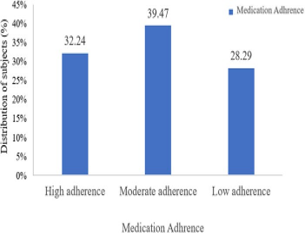Abstract
Tuberculosis (TB) is an infectious disease caused by bacteria called Mycobacterium tuberculosis. The disease mainly affects lungs and causes pulmonary tuberculosis. It can also affect intestine, meninges, skin, bones and other tissues of the body. Although the drugs alone can cure TB, it still remains a major public health problem worldwide. The aim of the study was to assess the quality of life and medication adherence in TB patients. The Quality of life was assessed using SF-36 in patients receiving DOTS treatment in initial or continuous phase while the medication adherence was analyzed using Morisky Green Levine Scale. Subjects were also counselled about their disease during their first visit and a follow up was done after a month. A total of 152 subjects were enrolled in the study of which majority of the subjects had Pulmonary TB (55.26%). Diabetes was found to be the most common comorbidity followed by HTN. The average Physical Component Summary (PCS) and Mental component summary (MCS) were found to be 44.34 and 39.60 respectively. Females had a better quality of life scores compared to males. High adherence was seen in 32.24% of patients while 28.29% had low adherence. Follow up was done for 135 subjects. 15 subjects defaulted and 2 of them died. There was a significant increase in the QoL scores and medication adherence after one month. A significant association was found between the Physical functioning (p=0.001) and emotional wellbeing (p=0.01) with Duration of treatment indicating that subjects who had completed more than one month of their treatment had marked improvement in Physical functioning and emotional well-being scores.
Full text article
Authors

This work is licensed under a Creative Commons Attribution-NonCommercial-NoDerivatives 4.0 International License.

